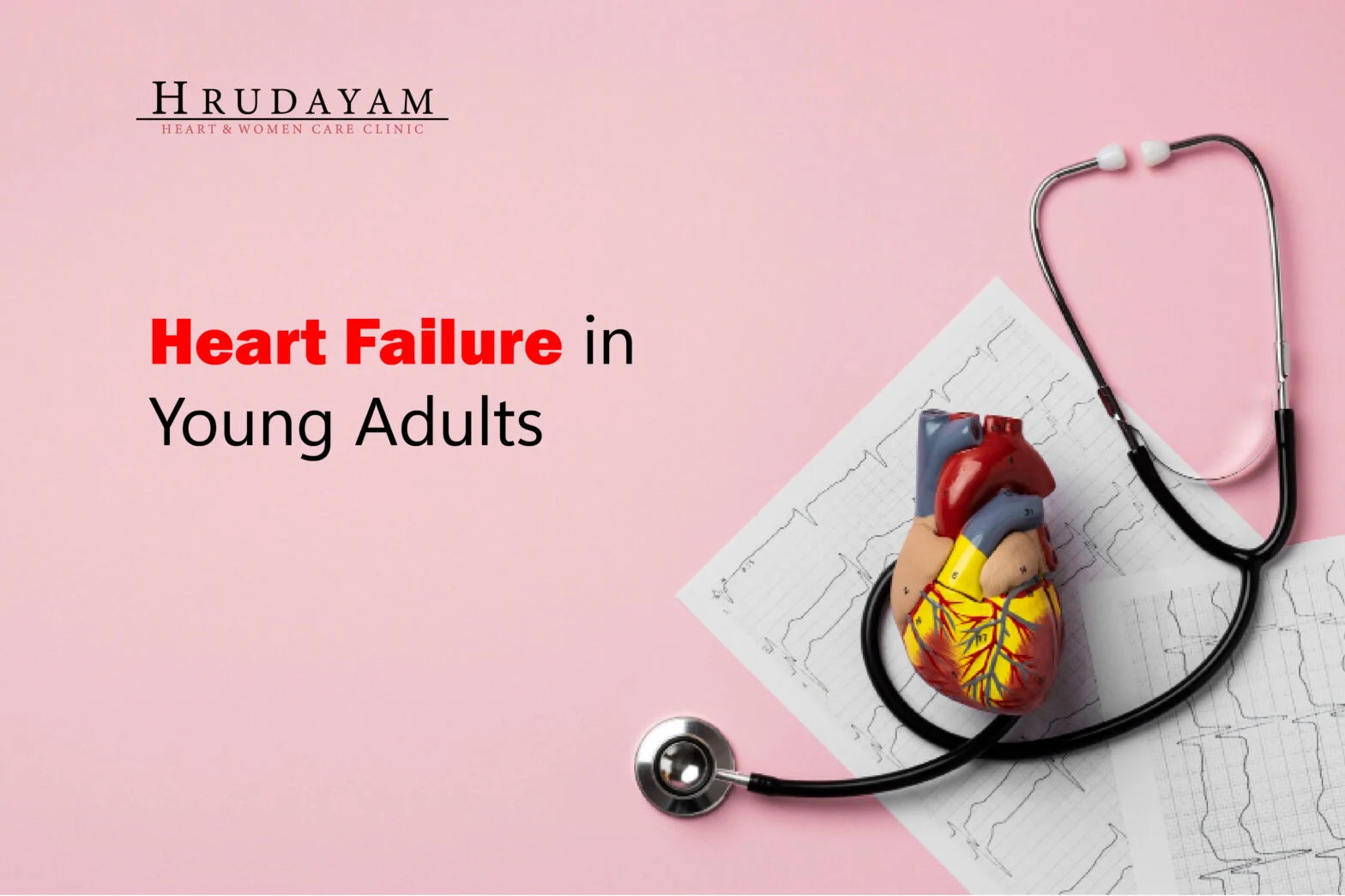Hrudayam Heart & Woman Care Clinic
The Heart Failure in Young Adults: A Growing Concern

What is Heart Failure?
Heart failure occurs when the heart is unable to pump blood efficiently to meet the body’s needs. It doesn’t mean that the heart has stopped working, but rather that it is struggling to perform its function. Over time, this condition can worsen if not managed appropriately.
Heart failure can be classified into two types:
- Left-sided heart failure: The left side of the heart is unable to pump blood effectively to the rest of the body.
- Right-sided heart failure: The right side of the heart is not able to pump blood to the lungs efficiently.
Heart Failure in Young Adults: The Rising Trend
In recent years, the incidence of heart failure in young adults—defined as those between the ages of 18 and 40—has increased. While heart failure in young people is still relatively rare compared to older adults, it is a growing concern.
Some studies indicate that the rate of heart failure in young adults has risen by over 20% in the past two decades. With the rise of obesity, sedentary lifestyles, and increased prevalence of conditions like diabetes and hypertension, heart failure is becoming more common in younger populations.
Causes of Heart Failure in Young Adults
Several factors contribute to the increasing cases of heart failure in young adults, including:
Many young adults develop heart failure due to congenital heart defects, which are conditions that exist from birth and can lead to complications as the person grows older. Conditions such as ventricular septal defects (VSD), atrial septal defects (ASD), and valvular heart disease may lead to heart failure later in life.
Symptoms of Heart Failure in Young Adults
The symptoms of heart failure in young adults can sometimes be subtle, which makes early detection challenging. Common symptoms include:
- Shortness of breath (especially during physical activity or while lying down)
- Fatigue and weakness
- Swelling in the legs, ankles, or abdomen
- Rapid or irregular heartbeat
- Persistent cough or wheezing
- Decreased ability to exercise or perform physical activities
- Chest pain or discomfort (if caused by an underlying condition like a heart attack)
If any of these symptoms are noticed, it’s essential to seek medical advice as early intervention can significantly improve outcomes.
Risk Factors for Heart Failure in Young Adults
Several risk factors increase the likelihood of developing heart failure at a young age, including:
- Obesity: Excess body weight increases the strain on the heart and raises the risk of conditions like hypertension, diabetes, and sleep apnea, all of which can contribute to heart failure.
- Family History: A family history of heart disease or congenital heart defects may increase the risk of heart failure in young adults.
- Poor Diet and Lack of Exercise: Diets high in processed foods, sodium, and unhealthy fats, combined with a sedentary lifestyle, significantly contribute to the development of heart disease and heart failure.
- Smoking and Alcohol Use: Smoking and excessive alcohol consumption are significant risk factors for heart failure, as they can damage blood vessels, increase blood pressure, and weaken the heart muscle.
- Underlying Conditions: Having chronic conditions such as diabetes, high cholesterol, or hypertension can increase the risk of heart failure, even at a young age.
Preventing Heart Failure in Young Adults
The good news is that heart failure is preventable in many cases, particularly in younger adults. Here are some key steps for prevention:
- Maintain a Healthy Weight: Being overweight increases the risk of hypertension, diabetes, and other conditions that strain the heart. Eating a balanced diet rich in fruits, vegetables, lean proteins, and whole grains can help manage weight.
- Exercise Regularly: Regular physical activity strengthens the heart, improves circulation, and helps manage weight. Aim for at least 150 minutes of moderate exercise each week.
- Manage Stress: Stress management techniques like yoga, meditation, or deep breathing exercises can improve mental health and reduce the risk of heart failure.
- Avoid Smoking and Limit Alcohol: Smoking and excessive alcohol consumption are major risk factors for heart disease. Quitting smoking and limiting alcohol can reduce the strain on the heart and improve overall health.
- Monitor Blood Pressure and Cholesterol: Regular check-ups to monitor blood pressure, cholesterol levels, and blood sugar can help catch potential problems before they lead to heart failure.
- Get Regular Health Screenings: Early detection of underlying health conditions like high blood pressure, diabetes, and high cholesterol can prevent complications later in life.
Conclusion
Heart failure in young adults is no longer just a concern for the elderly. With rising rates of obesity, poor lifestyle habits, and increasing stress, young people are at greater risk of developing heart failure earlier in life. Early intervention, lifestyle changes, and proper medical care can prevent or manage heart failure and ensure a longer, healthier life.
If you’re a young adult, it’s important to take your heart health seriously. Regular check-ups with your healthcare provider, along with maintaining a healthy lifestyle, can go a long way in preventing heart failure and ensuring the well-being of your heart for years to come.
FAQs of Dyslipidemia
What causes heart failure in young adults?
Heart failure in young adults can be caused by a variety of factors, including congenital heart defects, cardiomyopathy, obesity, high blood pressure, stress, poor diet, smoking, and alcohol use. It may also develop after a heart attack or due to underlying conditions like diabetes.
Is heart failure common in young adults?
What are the symptoms of heart failure in young adults?
How can I prevent heart failure at a young age?
Prevention involves maintaining a healthy weight, exercising regularly, eating a balanced diet, managing stress, avoiding smoking and excessive alcohol use, and getting regular check-ups to monitor heart health, blood pressure, and cholesterol levels.
